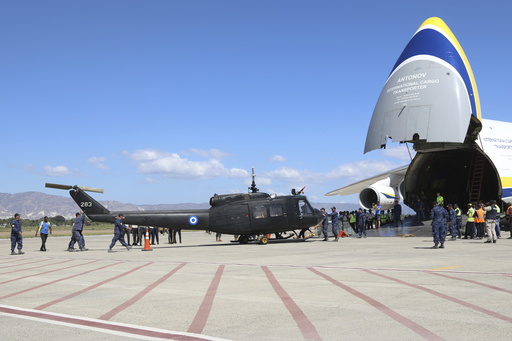
PORT-AU-PRINCE, Haiti – On Thursday, a contingent of 200 Kenyan police officers arrived in Haiti, marking the fourth deployment from Kenya aimed at combating escalating gang violence in the country. This new group joins over 600 Kenyans already collaborating with Haiti’s National Police as part of a multinational force, which includes contributions from nations such as Jamaica, Guatemala, and El Salvador.
Godfrey Otunge, the commander of the mission, welcomed the new officers at Haiti’s main international airport, which has been shut down for commercial flights due to ongoing gang activities. He expressed optimism about the nearing of full operational capacity, saying, “We are reaching close to our full strength so the mission can start giving results.”
The arrival of the Kenyan officers comes amidst concerns regarding a recent U.S. decision to freeze $13.3 million intended for the U.N.-backed mission, in a broader foreign assistance cut initiated by President Donald Trump. Otunge clarified that this amount constitutes less than 3% of the mission’s ongoing funding. He reassured both local citizens and stakeholders that operations remain on course, highlighting ongoing logistical, financial, and equipment support from the U.S. and other international partners.
Continuing assistance includes the recent delivery of armored equipment to support mission efforts and the Haitian police force. The U.S. State Department has also approved waivers for $40.7 million in foreign aid specifically earmarked for the mission and the Haitian National Police.
Haitian Prime Minister Alix Didier Fils-Aimé underscored the dire need for security in the nation, directly referencing the supplied equipment as crucial for progress. He indicated that the necessary support was indeed on the way, showing a commitment to improving the current situation.
During a related press conference, Dominican Republic President Luis Abinader stated that Haiti’s situation poses a significant threat to regional stability, including the United States. He urged for a heightened financial commitment to the mission, poignantly remarking, “Haiti is drowning.” Abinader also called for increased humanitarian aid to alleviate the severe crisis, which he believes could help stem the Migratory surge impacting neighboring countries.
U.S. Secretary of State Marco Rubio acknowledged the importance of broadening the Kenyan-led mission to more effectively tackle gang violence in Haiti. He articulated a sense of urgency about the situation, calling it a tragic reality that must be confronted head-on. “We are going to help,” he affirmed, while also emphasizing that the future of Haiti rests with its own people.
William O’Neill, a U.N. expert on Haiti, commented on the critical role the mission plays in helping local law enforcement regain control amidst overwhelming gang violence. With gangs reportedly overpowering the Haitian National Police, he stressed the necessity for reliable funding and regional cooperation to enhance stability, which would ultimately benefit migration dynamics as well.
Earlier in the week, Rubio also reached out to Kenyan President William Ruto, expressing gratitude for Kenya’s leadership in the mission and its ongoing commitment to fostering peace in the Democratic Republic of the Congo.
The mission, which commenced last year, continues to grapple with a lack of resources and personnel as gangs dominate approximately 85% of Port-au-Prince, further complicating the country’s security landscape. Recent reports indicate that a violent week-long siege in a wealthy neighborhood near the capital has resulted in around 150 fatalities, according to Marie Yolène Gilles of the nonprofit Fondasyon Je Klere. Over 100 homes have reportedly been torched, and more than 1,660 people have become homeless as a result of the violence, according to data from the International Organization for Migration.

